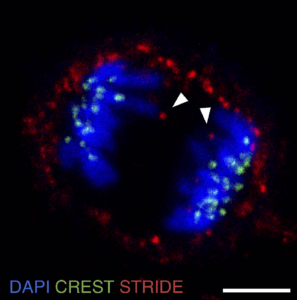STRIDE featured in Frontiers by our partners at Universitat Autònoma de Barcelona
The research group led by Prof. Anna Genesca at Universitat Autònoma de Barcelona uses STRIDE to gain insight into the potential mechanisms underlying chromosome bridge-induced genome instability. With their research, the investigators want to address the question of how and when chromosome bridges are resolved.
KRAKÓW, POLAND, & BARCELONA, SPAIN, 28 September 2021 – Prof. Anna Genesca’s group at the Department of Cell Biology, Physiology and Immunology, Universitat Autònoma de Barcelona, relied on STRIDE for direct DNA break detection in chromosome bridges. Chromosome bridges are a common feature of chromosome instability, the hallmark of human cancer associated with poor prognosis, cancer progression and therapeutic resistance. In recent years, chromosome instability is being harnessed for therapeutic purposes, yet some of its underlying mechanisms remain unclear. Our partners at the Universitat Autònoma de Barcelona have the objective to understand these processes better.

In their research published in Frontiers in Cell and Developmental Biology, Prof. Anna Genesca’s team summarize their findings on chromosome bridge formation during cell division. They conclude that most of the chromosome bridge discontinuities they observed reflect a real breakdown of the chromatin fiber and suspect that the mechanism responsible for their formation may depend on separation between the bridge kinetochores. The STRIDE assay was used for direct double-strand DNA break detection in chromosome bridges during mitosis to confirm data gathered with methods that are based on monitoring of histone modification at the damage sites.
About STRIDE
STRIDE, Sensitive Recognition of Individual DNA Ends, is a highly sensitive technology for direct detection of DNA breaks developed by intoDNA S.A., Kraków. It is an innovative technology that outcompetes any other tools in its sensitivity, providing a reliable measure of DNA damage at an individual lesion level. It is selective in labeling either single- or double-strand DNA breaks. STRIDE has been successfully used by leaders in the biotechnology and pharmaceutical industries and renowned academic groups in DNA damage response and cancer immunotherapy space.